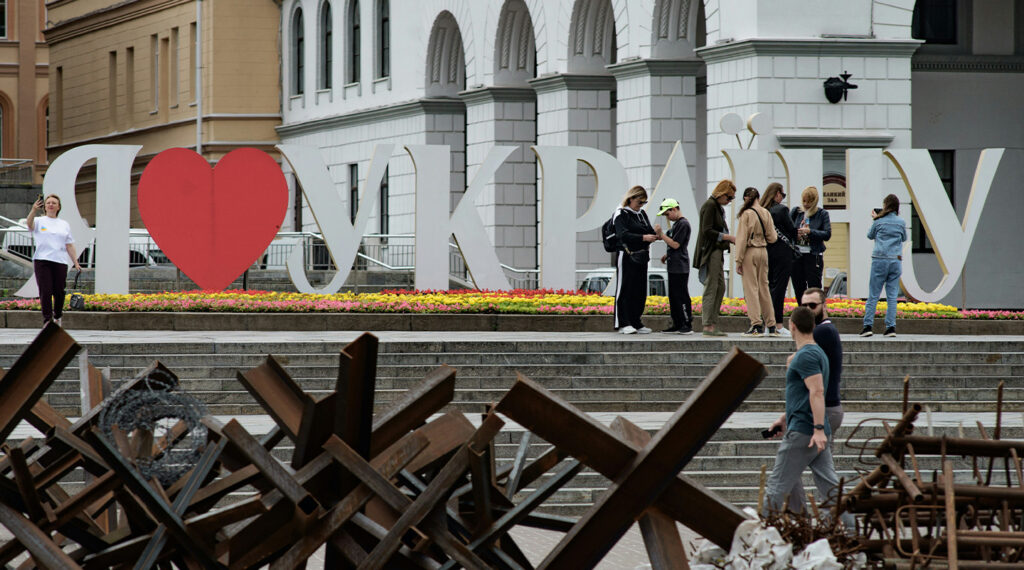From resolve to rebuild: The role of philanthropy in the war in Ukraine

The Council on Foundations, the Charles Stewart Mott Foundation and Philea hosted “Global Philanthropy’s Crucial Role in Ukraine on the Second Anniversary of Russia’s Invasion”, online on 29 February, to learn more about the present state of Ukraine and opportunities for philanthropy. Guest speakers included Professor Timothy Snyder, Yale University; Yuliya Tychkivska, Executive Director, Aspen Institute Kyiv; and Ondřej Liška, Regional Director, Europe, Porticus.
Even in an era defined by myriad global challenges and conflicts, the war in Ukraine stands out as a stark reminder of the ongoing struggle between democratic principles and authoritarian might. Now entering its third year, the conflict has transcended national boundaries to become a pivotal moment in modern geopolitical history, and the response of the global philanthropic sector reveals an urgent need for a more sustained and adaptable approach. The conflict’s ramifications extend beyond the immediate humanitarian crisis, touching upon fundamental aspects of international order, democracy, and ethical norms.
“If we lose this war, if we let the Ukrainians lose, we’ll lose a great part of our souls. We will be demoralised, finding it harder to hold on to the sense that some things are truer than others and some things are better than others.”- Professor Timothy Snyder, Yale University
Professor Snyder’s insights drew attention to an often-overlooked dimension of philanthropy in conflict scenarios: the defence of ethical and empirical truths. In a world increasingly clouded by misinformation and cynical politics, Ukraine’s struggle represents not just a fight for territorial sovereignty, but also a battle to protect democratic values and the rule of law. It is in this second arena – in addition to the first – that philanthropic organisations can play a crucial role as defenders and promoters of these values.
The Ukrainian conflict, then, highlights the inadequacy of a purely reactive philanthropic response. Emergency aid and humanitarian assistance are absolutely crucial, but there is also a need to address causes as well as symptoms. In turn, support will not only be required for the physical and mental restitution of a nation, but also to ensure the sustenance of its democratic institutions and civil society.
“If we were to be erased as a sovereign state and nation, what will happen next? Will it make our democracies stronger, our markets prosper, our world a better and safer place?” – Yuliya Tychkivska, Executive Director, Aspen Institute Kyiv
The role of philanthropy in this context is threefold: supporting resilience, fostering innovation, and maintaining public attention. Firstly, resilience in Ukraine goes beyond survival; it involves maintaining a sense of community, preserving cultural heritage, and sustaining hope for the future. Philanthropic efforts should therefore include supporting education, mental health initiatives, and the rehabilitation of veterans – all crucial components in rebuilding a society torn apart by conflict.
Secondly, Ukraine’s situation presents a unique opportunity for philanthropic organisations to foster innovation in areas like governance, social entrepreneurship, and sustainable development. By investing in local initiatives and grassroots organisations, philanthropy can play a pivotal role in not just rebuilding Ukraine, but in reimagining it as a model of resilient, democratic governance.
Lastly, and perhaps most critically, philanthropy must take on the mantle of helping to maintain public opinion, at a point when, as Ondřej Liška explained it, Ukraine is not only fighting a military war with Russia, but also a “war of attention”. As attention wanes and conflict fatigue sets in globally, philanthropic organisations have the resources and platforms to keep the Ukrainian crisis in the public eye. This involves not just raising awareness, but also combating misinformation, promoting informed dialogue, and ensuring that the narrative of the conflict is not lost in the cacophony of global news.
Professor Snyder explained that the war is a battle for the future, where Ukrainians are fighting not just for their land but for a vision of a freer, more just world. This isn’t just about supporting a nation in distress; it’s about investing in a future that aligns with the core values of democracy and freedom that many philanthropic organisations espouse.
However, there are challenges to this expanded role of philanthropy. It requires a departure from traditional modes of operation – moving away from a project-based, short-term outlook to a more strategic, long-term vision. It demands greater collaboration among philanthropic organisations, governments, and civil societies, transcending geographical and ideological boundaries. It also calls for a deep understanding of the local context and needs, ensuring that the support provided is desired, relevant and impactful.
“[Our Ukrainian partners] ask us, all of us, to spread our philanthropy to the grassroots. If they are willing to go the extra mile then we should too. Let’s give in the long term, as none of us can see where the end of the war is. We have to adapt, we have to be flexible… rules can be broken but principles stay. So, let’s give along principles, and make the rules as flexible as possible. Let’s give empathically – we can hardly imagine what the needs are, so let’s listen even more carefully.” – Ondřej Liška, Regional Director, Europe, Porticus
In conclusion, the Ukrainian conflict presents an unprecedented challenge but also an opportunity for the philanthropic sector to redefine its role in the global arena. By supporting resilience, fostering innovation, and maintaining public opinion, philanthropy can contribute significantly to not only the resolution of the current crisis but also to the prevention of future conflicts. This is a call to action for philanthropic organisations to step up and embrace their potential as catalysts for change in a world that desperately needs it. As Professor Snyder rightly puts it, the stakes couldn’t be higher – it’s a battle for the soul of our global community.
The event formed part of Philea’s Philanthropy for Ukraine initiative. Watch the full recording of the event here.
Authors


